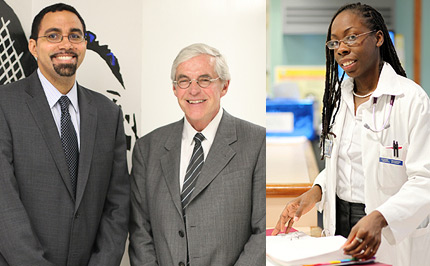State Education Commissioner John B. King, Jr., Visits SUNY Downstate and Clara Barton High School to Meet with Educators and Students
May 7, 2012

Commissioner King & Dr. James Cottrell (L); Med. Student Diane Rohden (R)
New York State Education Commissioner John B. King, Jr., was in Brooklyn recently
to visit SUNY Downstate Health Sciences University and Clara Barton High School. His
intention was to learn more about programs in Brooklyn that motivate young people
to pursue careers in the health sciences, among them the Science and Technology Entry
Program (STEP). There are 60 STEP programs at institutions of higher learning and
professional schools across New York State.
Dr. King learned first-hand of the STEP program’s influence on high school students
in Brooklyn by meeting Diane Rhoden, a Clara Barton High School graduate who was part
of STEP at Downstate and who is graduating this year from Downstate’s College Medicine.
Dr. King also met with current high school students, teachers, and administrators
at Clara Barton.
Dr. King said, “Clara Barton High School, SUNY Downstate Health Sciences University, and their community partners have created a model program leading minority and disadvantaged young people in Brooklyn to careers in the health sciences. Statewide, the Science and Technology Entry Program is increasing college and career readiness, with results that show STEP students outperforming their non-STEP peers."
“I will be forever grateful to all the teachers, guidance counselors, family and friends who contributed to my education,” said Ms. Rhoden. “As a high school student, the STEP program was not only a great resource but provided continual support throughout my high school and medical school experience. In my high school years the STEP program dedicated many Saturday afternoons to exposing us to museums that showed us the history of city life, broadening my understanding of the cultural diversity of New York City. STEP found a way to link the great expanse of cultural opportunities with the greater vision of going to college. We were taken on college tours all around the city and provided with college counselors who would work with our families to define our goals for college selection.”
She added, “Many of my classmates agreed that STEP was a gift. We were all coming from households that would not have been able to afford many of these same services, had we not been introduced to STEP. Thinking about college earlier in high school helped me to focus my plans and eventually confirm my decision to become a student of medicine. I am thankful to all the STEP workers who invested time in the futures of so many high school students, especially the program coordinator, Moleendo Stewart.” Ms. Rhoden was born in Brooklyn and raised in the East New York section of the borough.
Dr. King, who also was born in Brooklyn, was accompanied on his visit by James E. Cottrell, MD, a member of the New York State Board of Regents. Dr. Cottrell is distinguished service professor and chair of anesthesiology at SUNY Downstate. Dr. King also met on campus with Downstate President John C. LaRosa, MD; Ian L. Taylor, MD, PhD, senior vice president for biomedical education and research and dean of the College of Medicine; and other campus officials.
The STEP partnership program, sponsored by the Office of Minority Affairs at SUNY
Downstate, is a three year, after-school academic enrichment program for students
attending one of five Brooklyn high schools: Clara Barton, School of Democracy and
Leadership, Brooklyn Generation, Bishop Loughlin, and Nazareth Regional High School.
STEP is designed for under-represented minority students and students of limited financial
means. Approximately 150 students have participated in STEP at SUNY Downstate.
SUNY Downstate’s STEP program is a participant in the Health Science Academy of the
Arthur Ashe Institute of Urban Health, whose main office is on the Downstate campus.
The program allows students to develop their scientific and critical thinking skills
through the study of the anatomy and physiology of different organ systems. In addition,
students participate in college preparatory and cultural enrichment activities.
The Health Science Academy (HSA) is a three-year, after-school science enrichment
program for high school students from sophomore through senior year. HSA recruits
college-bound, academically talented students interested in pursuing careers in the
health sciences, such as medicine, nursing, public health, and research. Academy Scholars
come from groups that have been historically under-served and under-represented in
the health sciences and higher education.
Academy instructors and guest speakers include SUNY Downstate faculty, medical and
nursing students, and Academy staff. Academy Scholars commit to completing six college-level
modules over a period of three years and maintaining an 85 percent average in their
high school coursework. Classes are small, involving hands-on clinical exposure, case-based
learning, lab tours, field trips, presentations, and dissections. Since 1994, more
than 800 young people have attended the Academy.
For more information on programs for undergraduate students at SUNY Downstate Health Sciences University, please visit:
###
About SUNY Downstate Health Sciences University
Downstate Health Sciences University in Brooklyn is one of four academic health centers (AMCs) in The State University of New York (SUNY) 64-campus system and the only SUNY AMC in New York City dedicated to health education, research, and patient care for the borough’s 2.7 million residents. Its flagship hospital, University Hospital at Downstate (UHD), is a teaching hospital and benefits from the expertise of Downstate’s exceptional medical school and world-class academic center research facilities. With a staff of over 800 physicians representing 53 specialties and subspecialties, Downstate offers comprehensive healthcare services to the community.
UHD provides high-risk neonatal and infant services, pediatric nephrology, and dialysis for kidney diseases and is the only kidney transplantation program in Brooklyn. Beyond its clinical expertise, Downstate houses a range of esteemed educational institutions, including its College of Medicine, College of Nursing, School of Health Professions, School of Graduate Studies, and School of Public Health. Downstate fosters innovation through its multifaceted biotechnology initiative, the Biotechnology Incubator and BioBAT, which support early-stage and more mature biotech companies.